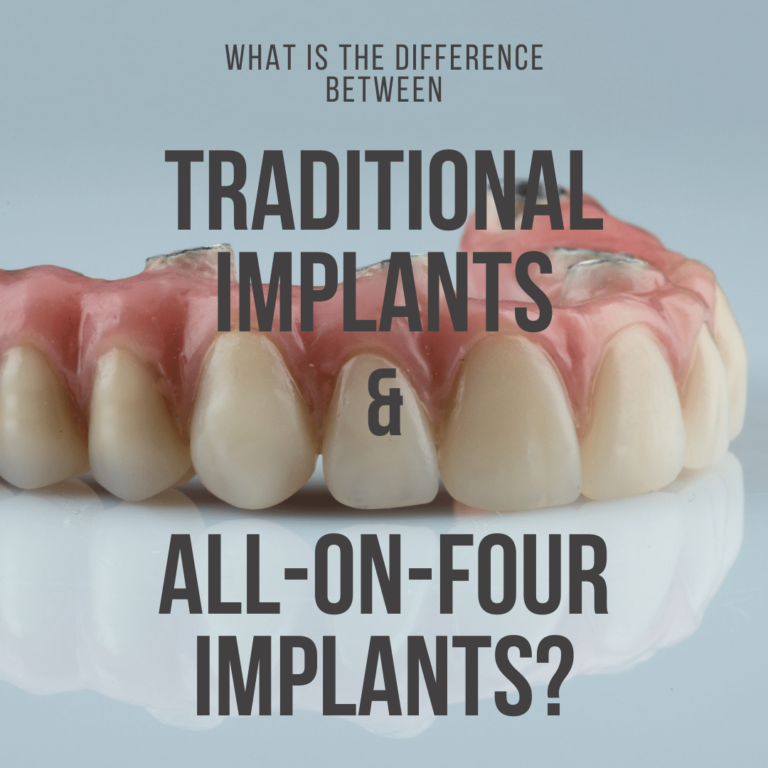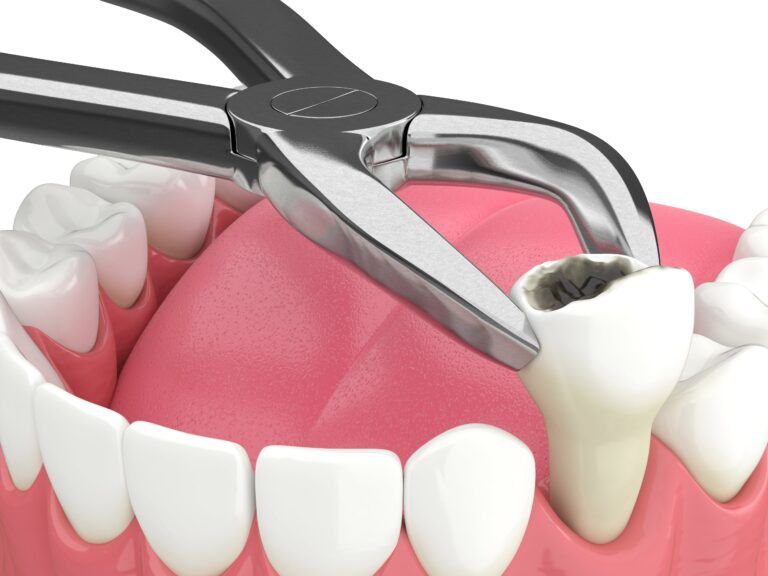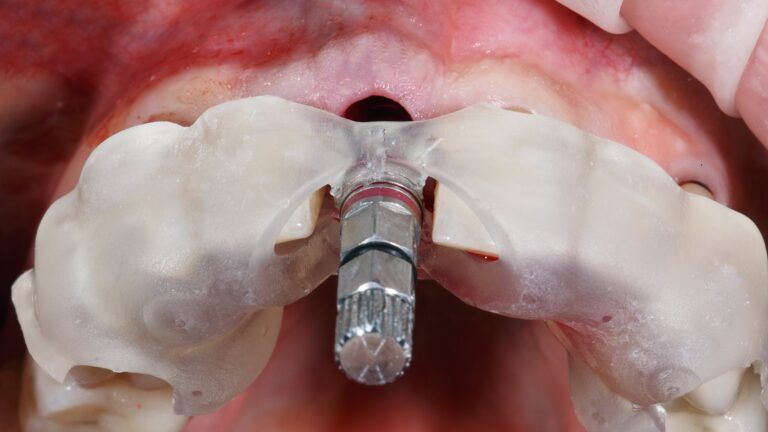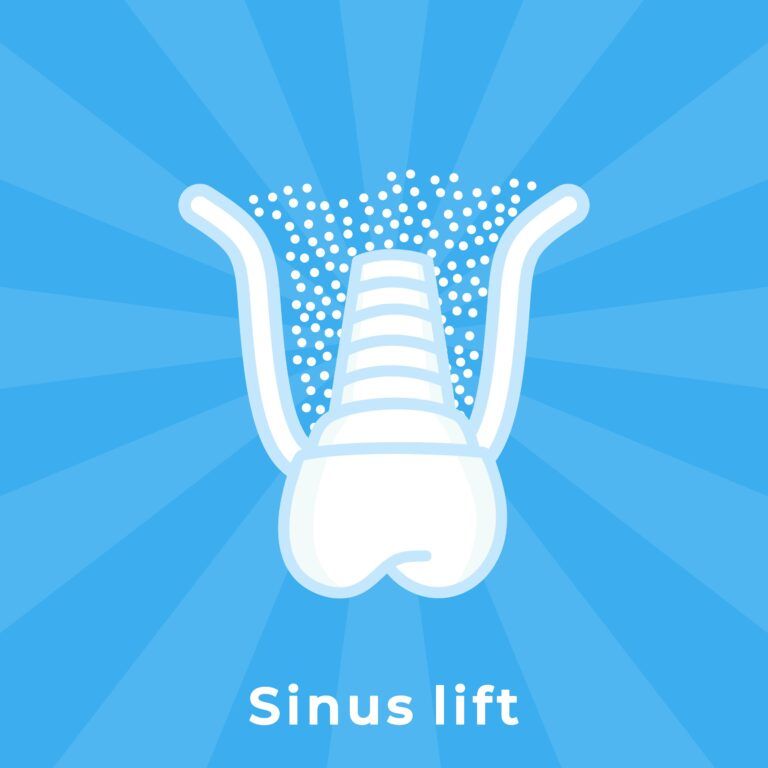When it comes to dental implants, there are two main types: traditional implants and all-on-four implants. If you are considering dental implants as an option for restoring your smile, you may be wondering about the difference between the two. Both have their own unique benefits, but which one is right for you? In this blog post, we will discuss the similarities and differences of these two types of implants so that you can make an informed decision about which is best for you.
What are traditional dental implants?

Traditional implants are the most common type of dental implant. They are made up of a titanium screw that is placed into the jawbone and an artificial tooth that is attached to the screw. When used to replace a full arch of missing teeth, a minimum of six traditional implants are generally used to support a denture. However, there are also cases where more implants may be needed to properly support the denture.
Traditional implants are strong and durable, and they can last for many years with proper care. However, they require a longer healing time because the titanium screw must fuse to the jawbone before the artificial tooth can be attached.
What are all-on-four dental implants?
All-on-four dental implants are a newer method of implant placement that is becoming more popular. Like the name suggests, they are made up of four titanium screws that are placed into the jawbone and a full set of artificial teeth that are attached to the screws. All-on-four implants are strong and durable, and they can last for many years with proper care. They have a shorter healing time than traditional dental implants because all four screws can be placed at once.
What are the differences between traditional implants and all-on-four implants?
While both traditional implants and all-on-four implants are made up of titanium screws and artificial teeth, are both strong and durable, and last for many years with proper care, these two options have a few key differences that you should be aware of.
Number of Screws Used
The main difference between traditional implants and all-on-four implants is the number of titanium screws that are used. To place a denture, traditional implants use six or more screws per arch, while all-on-four implants only use four screws. This means for a full-mouth replacement, traditional implants require 12 or more implants, whereas using the all-on-four system only requires 8 implants.
Placement
The reason why all-on-four implants are able to only use four implants per arch is because of the way they are placed. All-on-four implants are placed at an angle towards the back of the mouth, which allows them to anchor into the jawbone more securely. This placement also helps to distribute the weight evenly across all four screws, which makes them stronger and more durable than traditional implants. In some cases, the all-on-four implant system can also be used with zygomatic implants, which are specialized implants that are made to attach to the zygomatic bones.
Reduced Need for Bone Augmentation
Another benefit of all-on-four implants is that they often do not require bone augmentation procedures such as sinus lifts and bone grafts. Bone grafts and/or sinus lifts are commonly needed with traditional implants because the jawbone needs to be strong enough to support the titanium screw. However, all-on-four implants are able to maximize contact with the jawbone, which means they can be placed more securely. They can also be strategically placed in areas that have more bone mass. This can save you both time and money, as bone augmentation procedures can be expensive and require a longer healing time.
Healing Time
Another difference between traditional implants and all-on-four implants is the healing time. Traditional implants require a longer healing time because each screw must be placed individually and allowed to fuse to the jawbone before attaching the artificial tooth. The recovery process can also be lengthened by the need for a bone graft or sinus lift. All-on-four implants have a shorter healing time because all four screws can be placed at once, which means you will not have to wait as long to get your new teeth. It is also not very likely that you will need bone augmentation procedures while getting all-on-4 implants.
Cost
The final difference between traditional implants and all-on-four implants is the cost. Traditional implants are typically more expensive than all-on-four implants because they require more screws to be placed. They may also require bone augmentation procedures, such as a sinus lift or bone graft. All-on-4 implants tend to be more affordable because they require less implants and no bone augmentation procedures. However, the overall cost of your implant treatment will depend on many factors, such as how many implants you need and what type of artificial teeth materials you choose.
Which is Right for You?

So, which type of implant is right for you? Generally speaking, traditional implants are a good choice for individuals who are looking to replace a single missing tooth with an implant-supported crown or multiple missing teeth with an implant-supported bridge. All-on-four implants, on the other hand, are generally preferential for those who are looking for an easy way to replace an entire arch or mouthful of teeth. In some cases, however, your dentist may recommend one treatment over another once they have evaluated your individual case.
Ultimately, the best way to determine which type of implant is right for you is to consult with your dental implant specialist. They will be able to assess your individual needs and recommend the best type of implant for you.
No matter which type of implant you choose, you can be sure that you are getting a strong and durable tooth replacement option that will last for many years with proper care. If you have any questions about dental implants, or if you would like to schedule a consultation, please contact our office today. We would be happy to help you choose the best implant option for you and answer any questions that you may have to help you restore your smile!

Irfan Atcha, DDS, DICOI, DADIA at New Teeth Chicago Dental in Chicago, Illinois is a board-certified general dentist and a nationally recognized expert in dental implants, cosmetic dentistry, and sedation dentistry. Dr. Atcha is now serving patients in Naples, Bonita Springs and SW FL area with All-on-4 implants, teeth-in-a-day, same day dental implants and the complex zygomatic dental implants for the no-jaw bone solution approach. To schedule a consultation please email Dr. Atcha at teethforyou@gmail.com.





